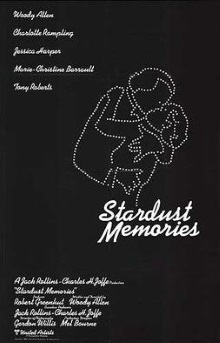
Here’s yet another film by Woody Allen and though his career may be over, his back catalogue is so extensive that there is still plenty of interesting work to be explored. The director himself does appear in this one and as the character he plays is himself a director, it isn’t surprising that most people see this film as being autobiographical. Allen however has always denied this.
Sandy Bates is a successful director who is well known for his comedies. Lately however he has been experiencing a sort of mid-life crisis as he questions the meaning of life. His latest film is an absurdist work with a depressing ending but it is not well received by the studio which wants him to go back to making comedies. He goes to attend a weekend retrospective of his work where he is constantly mobbed by fans, aspiring actors and members of the public who want him to endorse various causes. Meanwhile a lover of his, Isobel, leaves her husband for him and he has to decide if he wants to marry her. He also meets Daisy and seems to click with her though she is attending the event with her boyfriend. Flashback scenes show him recalling a previous relationship with another girl Dorrie who had an unstable personality.
More so than many of Allen’s films, this is a surrealist work, especially when it shows the film within a film that Bates is working on. The final scenes of Bates randomly wandering into a strange convention of believers in the supernatural, conspiracy theorists and other crazies could have come right out of something by Jean-Luc Godard. The film as a whole is a conscious parody of Federico Fellini’s 8½. Despite the difference in style and form however, the theme is still the usual Allen insecurity about his life and especially the women in it. The obvious tension here is that Bates finds himself constantly being torn between women like Isobel, who offer stability and family, and those like Daisy and Dorrie, who are brilliant and fun to be with, but can be impossible to deal with during the times when they are crazy.
There might be some worthy ideas here but unfortunately overall it feels mostly like a weak attempt to copy the style of other directors without most of the originality and substance. The most annoying thing about it is that underneath the New Wave trappings we can still discern Allen’s habitual schtick of seemingly downplaying himself when overall the effect is to glorify himself as a celebrated director and even as a virile man. In the post #MeToo world, his invitation to Dorrie to open up about fantasies of being sexually attracted to her own father while his hands are all over her is positively creepy, In every instance, Bates has complete confidence in being able to obtain any of the women he is attracted to even if they are already in relationships. As such his only dilemma is which of them to choose. This self-aggrandizement is all well and good for Allen but it isn’t terribly interesting to the audience and doesn’t seem to be in keeping with the spirit of the famous films which he is emulating here.
I suppose that the bits about this being a sort of cry for help by a maker of comedies who really wants to be seen as making great art does give it some value. But the focus does seem to be on the women in his life and while Allen dresses up his attraction to them in intellectual terms, in light of everything that he has said and done, to me this film makes him look like a sex-obsessed creepy old man.